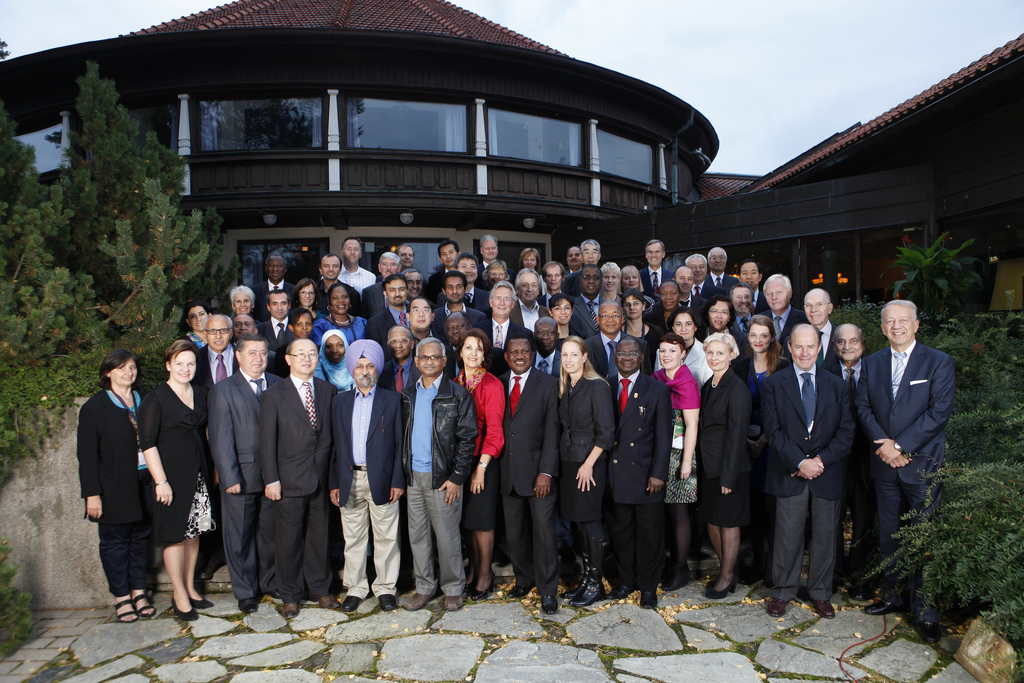2011 IANPHI Annual Meeting: Towards Strong and Connected Public Health Institutes
Public health leaders from around the world gathered in Helsinki, Finland, in late fall 2011 to explore topics ranging from the growing prevalence of noncommunicable diseases and associated tobacco risk factors to maternal health, HPV vaccines, and NPHI response to disasters.

Attending were national public health institute directors from 50 countries plus representatives from the World Health Organization and other IANPHI partners who participated in technical sessions, networking, and sharing experiences to strengthen capacity and prevent and respond to health threats.
During the business meeting, the General Assembly of members welcomed four new institutes. Three institutes were approved for full membership:
- Nigeria’s Centre for Disease Control
- India’s National Centre for Disease Control
- Ecuador’s National Institute for Hygiene and Tropical Medicine
Nigeria’s National Primary Health Care Development Agency will be an associate member of IANPHI.
With the addition of four new institutes to its growing roster, IANPHI’s membership now numbers 79 institutes from 74 countries. Since its founding in 2006, IANPHI has more than doubled its membership. IANPHI members represent Europe, Africa, Asia and the Americas and almost 5.5 billion people or 79% of the world’s population.
During the meeting, IANPHI also approved five new members of the Executive Board. The 11-member policy-making board provides policy oversight from respected leaders of national public health institutes from around the world. The new members are:
- David Butler Jones, Canada (chief public health officer, Public Health Agency of Canada)
- Reinhard Burger, Germany (president, Robert Koch Institute)
- Rajae El Aouad, Morocco (director, National Institute of Hygiene)
- Mwele Ntuli Malecela, Tanzania (director-general, National Institute for Medical Research)
- Justin McCracken, UK (chief executive, Health Protection Agency)
IANPHI is grateful to these retiring members of the Executive Board and thanks them for their tireless energy and dedication to strengthening and linking the world's public health institutes:
- Mohammed Hassar, Morocco (former director, Pasteur Institute)
- Tsehaynesh Messele, Ethiopia (former director, Ethiopian Health and Nutrition Institute)
- Pathom Sawanpanyalert, Thailand (director, National Institute of Health)
- Geir Stene-Larsen, Norway (director, Norweigian Institute of Public Health)
- Jane Wilde, Ireland (former director, Institute of Public Health)
See the 2011 Annual Meeting Agenda
See the 2011 General Assembly Agenda
Presentations
International Public Health Instrument for NCDs and National Public Health Institutes – the Experience of the WHO Framework Convention on Tobacco
Haik Nikogosian, WHO - Framework Convention on Tobacco Control
Tanja Knezevic, Serbia - Implementation of WHO Framework Convention on Tobacco Control in Republic of Serbia
Arash Rashidian, Iran - Evidence and Policies for Reducing Smoking in Iran
Mario Henry Rodriguez, Mexico - Participation of the NIPH in the implementation of FCTC in Mexico
Innocent Ujah, Nigeria - WHO Framework Convention on Tobacco Control - Efforts Made by Nigeria
Maternal Health
Heli Bathija - Achieving MDG5: reducing maternal mortality and achieving universal access to reproductive health
Mika Gissler, Research Professor, THL, Finland - Maternal Health in Finland
Chhea Chhorvann, Cambodia - Maternal Health In Cambodia
Elias Sory, Ghana
Global challenge of NCD monitoring and surveillance
Sergei Boytsov, Russia - Global challenge of NCD monitoring and surveillance
Pekka Puska, Finland - NCD Monitoring and NPHIs
Miroslaw J. Wysocki, Poland - Iceberg Phenomenon in Epidemiology
Janchiv Oyunbileg, Mongolia - Mongolia: NCD Monitoring and Surveiilance
Mwele Ntuli Malecela, Tanzania - NCDS in Tanzania
HPV vaccines and screening in prevention of cervical cancer
Pekka Nieminen, Chief Physician, Helsinki University Hospital, Finland - Prevention and management of the HPV, the Finnish perspective
Andre N. Van der Zande, Netherlands
José Pereira-Miguel, Portugal - Prevention of cervical cancer in Portugal
Lital Keinan Boker, Israel - Cervical Cancer and HPV in Israel
Monitoring and Surveillance of Infectious Diseases
Mahmudur Rahman, Bangladesh - Surveillance in Bangladesh
Ilesh V. Jani, Mozambique - Opportunities to Learn and Build from Disease Specific Activities
Brazil - Epidemiological transition in Brasil between 1930 and 2009
Bashir Noormal, Afghanistan - Diseases Surveillance & Early warning System in Afghanistan
IANPHI Partnerships for Strengthened Public Health Infrastructures
Heidi Hautala, Minister for International Development, Finland
Prof. C. Anderson Johnson, Claremont University, LA, USA
Matt Hanson, Program Officer, Vaccine Delivery, Bill and Melinda Gates Foundation, USA
Ramesh Shademani, Technical Officer, WHO, Switzerland
Marc Sprenger, Director, ECDC, Netherlands
Keizo Takemi, Fellow, Sasakaw Memorial Health Foundation, Japan
Plenary: Social Determinants of Health
Sarah Wamala, Sweden - Social Determinants of Health
Mohammed Hassar, Morocco - Social Determinants of Health
Marija Seljak, Slovenia - Health Inequities in Slovenia
Plenary: Role of NPHIs in Public Health Crisis
Mario Henry Rodriguez, Mexico - Role of NPHIs in Public Health Crisis
Reinhard Burger, Germany
Kenji Hayashi, Japan - Japan, NPHI Response to the Tsunami
Peter Bloland, USA